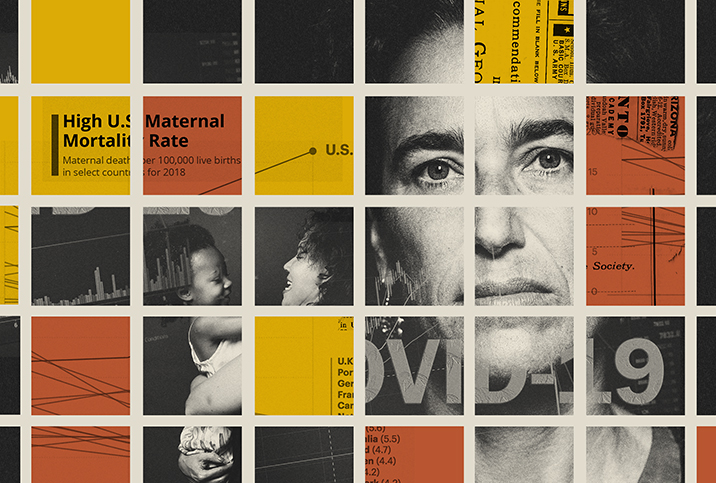The Growing Crisis of Black Maternal Health

A report by the Centers for Disease Control and Prevention (CDC) shows startling maternal mortality rates among Black women in the United States. In fact, the rates for non-Hispanic Black women in 2020 were significantly higher than rates for non-Hispanic White and Hispanic women, and increased dramatically from 2019.
"Black women are three to four times more likely to die from pregnancy-related causes than their white counterparts. It is, at this juncture, to be viewed as a public health and human rights violation; many of these outcomes could have been prevented," said Kecia Gaither, M.D., board-certified in OB-GYN and maternal-fetal medicine, and director of perinatal services at NYC Health + Hospitals/Lincoln in the Bronx in New York City.
Why are Black women more likely than white women to experience pregnancy complications? And how can Black women advocate for their healthcare rights?
It's important to first recognize women of color are not a singular group, said Alison Buist, Ph.D., health policy expert and medical advisor at the Body Agency, a sexual health and wellness company in San Anselmo, California. Their health depends on various factors, such as biology, genetics, culture, behavior and access to care.
For the purposes of this article, we will primarily talk about Black women in the United States.
Women's health care for women of color
Women of color have disproportionately higher risks of diabetes, obesity, heart disease, hypertension and cancer, particularly breast and cervical cancer, said Erica Montes, M.D., an OB-GYN in Phoenix and medical advisor at the Body Agency.
"While white women are more likely to have breast cancer, Black women have higher mortality rates from breast cancer," Montes said, adding that every year, more than 1,500 Black women die from breast cancer, an average of five per day. "There are also higher death rates from cervical cancer among older Hispanic women, Asian American women, and American Indian/Alaska Native women than among white women."
Healthcare provision for women of color can be mixed, according to Cindy Duke, M.D., a dual board-certified OB-GYN and virologist in the Las Vegas area.
"I think it depends on who they're seeing and the provider's commitment to ensuring that they have worked on eliminating disparities and have done internal work to address internal biases," Duke said.
"Unfortunately, within health care, many biases, particularly against women of color, have been hardwired into the system for well over a century," Duke continued. "Some of it is learned behavior, not intentional behavior, but again, it's mixed. It depends on who is providing the care and where and when the patient is accessing said care."
Why black women are at higher risk
"Increased Black maternal mortality has been scientifically linked to the stress caused by systemic racism, a lack of access to quality medical care, and delayed diagnoses by some providers," Montes said.
Hard-baked biases within the healthcare system and a structure of health care slanted against women of color can lead to a higher risk of maternal mortality, according to Duke.
"Black women are less likely to be taken seriously when they make complaints and less likely to be sent for diagnostic testing early enough to catch their situations before it's dangerous," Duke said.
Black women are more likely to be the head of their household, but have a lower income and lower accumulated wealth than counterparts of other races, Buist added. They're more likely to live in neighborhoods with lower property values, less outdoor space for exercise, poor quality of health care, less access to fresh foods and higher environmental pollution.
Black women are also less likely to have access to health insurance. About three-fifths of uninsured women in the U.S. are women of color.
"There's a term called weathering," Buist stated. "It's a very interesting concept where Black women age at a faster rate than their chronological age because of many things they experience in their life…Essentially, they have more barriers to health care, which they need due to higher rates of chronic health conditions."
"The main etiologies accounting for adverse perinatal outcomes among Black women fall, primarily, under those relating to hypertension, hemorrhage and infection," Gaither said, adding that these etiologies increase the incidence of preterm deliveries and low birth weight, creating poor neonatal outcomes for Black babies.
Gaither concurred with Buist, saying that the issue is multifactorial due to:
- Lack of healthcare access
- Poor quality of care, particularly for women of low socioeconomic status
- Bias, institutionalized racism and/or dismissive treatment
- Not being offered the same treatment or therapies offered to white women
- Underlying comorbidities, such as obesity, hypertension and diabetes, which can lead to poor outcomes when left untreated
- Poor nutritional status, such as vitamin D deficiency
- Psychosocial stressors—which are epigenetic factors—such as continued exposure to racism
"All these underlying factors leave Black pregnant women vulnerable from a reproductive standpoint," Gaither stressed.
Urgent maternal warning signs
Postpartum hemorrhage is the leading cause of maternal mortality, with Black women at higher risk. It occurs in about 3 percent to 5 percent of deliveries and is responsible for 12 percent of maternal deaths in the U.S.
"This high incidence rate is alarming because hemorrhage is among the leading causes of pregnancy-related deaths," Montes said.
She said warning signs in postpartum women include:
- Palpitations
- Dizziness
- Low blood pressure
- Feeling faint
- Soaking more than one pad an hour with blood
"If you had a cesarean, you could have internal bleeding that can cause the above mentioned symptoms except the heavy vaginal bleeding. If you are experiencing any of these signs, seek medical attention right away," Montes stressed.
"It goes back to late access to care due to distrust of the medical system and delayed action by healthcare professionals when patients present with these emergencies; not recognizing or delaying recognition that this person is at risk," Duke said.
"It's a constellation of things," she continued. "It's not just that health care has biases. It's not just that healthcare workers need to take more introspective steps, and it's not the individual worker only…We need the systems of the institutions to recognize that we need systemic change from the top to the bottom, changing how we teach people to recognize risk."
How can expectant black women find optimal care?
Gaither said it's best to go with recommendations given by friends or family members when choosing a healthcare provider.
"Research has provided credence that Black women and babies have better outcomes with providers who look like them," Gaither said. "Look for providers of color in your locale and seek information from the National Medical Association, the largest organization of Black physicians in the nation."
Gaither recommended websites you can access to help find the best level of care:
- To review hospitals that offer high-quality care, ExpectNY provides information on hospitals within New York City, and the Leapfrog Group has a hospital safety grade rating to evaluate hospitals in your location.
- Organizations such as Black Mamas Matter Alliance and National Birth Equity Collaborative have information about birthing while Black.
Do your research and find a healthcare team you can trust, Buist said.
"Your first visit may even be a little bit like an interview. If you don't like the doctor, if you don't think that the person you are seeing is listening to you, well, once you have your baby, the hospital will send you all kinds of surveys. Fill them out and make sure your voice is heard. Hospitals take these very seriously," she said.
The earlier you access care, the better, Duke stressed.
"I know a lot of patients are choosing not to go to certified, licensed healthcare professionals because they believe that it's more harmful for them than not, but that's not the case," she said. "It's actually better to establish care with someone you trust, someone with whom you have a good working doctor-patient relationship with at the start of your pregnancy or before pregnancy."
Montes added that it's important not to be afraid to ask your physician questions such as:
- Why did you choose your specialty?
- How can I contact you with health concerns?
- What resources does my delivery hospital have in case of obstetrical emergencies?
"If you don't get along with your doctor but feel you have to stay with them because your health insurance requires you to see this person, please follow up [with] your health insurance," Duke advised. "Most insurances have health advocates now. They can help you advocate to find a relationship that works for you."
How women of color can advocate for health care
"Know your rights and advocate for yourself. Having a doula while pregnant/during delivery/postpartum is an option. They can provide support and advocacy," Gaither said, adding that the National Black Doulas Association has a website that employs a state-by-state directory to help find a licensed doula in your area.
"Bring another set of eyes to your appointments to talk about the appointment, take notes and help you follow up afterward," Buist said. "Your birth partner would be ideal for this role; you can talk about the birth plan and how you want to advocate for yourself.
"You have to learn the basics, like what tests you need and when you need them, and get a primary provider," Buist added, stressing the importance of keeping good medical records about who your providers are, allergies you have and medications you're taking.
"Also, note any time you have a symptom, like how long ago did it start? So when you talk to your doctor, you can actually say, 'I've been experiencing this for X number of days.' You have got to learn about pregnancy," she said.
"Know your normal, baseline feeling and don't ignore pain. Reporting any discomfort or pain and making sure that you are heard is very important," Buist continued. "Listen to your body and trust your gut. If you think that something just doesn't feel right, make sure your healthcare provider knows that."
Pregnant Black women clearly face numerous obstacles while navigating the U.S. healthcare system. In addition to advocating for yourself, know that there are organizations and resources available to help locate the right provider for you.
"Most importantly, if you have a provider you feel is dismissive or doesn't 'hear you,' simply find another," Gaither advised. "You are not obligated to stay with a provider that doesn't address your concerns."


















